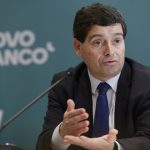Portuguese nationalist party Chega utterly condemns Putin’s Ukraine invasion
The leader of the Portuguese far right nationalist party Chega, André Ventura, roundly denounced Russia’s invasion of the Ukraine this week.
Addressing around 127 members of the International Club of Portugal, entrepreneurs and Chega party supporters, André Ventura said he had few doubts that Vladimir Putin is a war criminal.
Ventura, who received so many rounds of applause — including a standing ovation — that it seemed like a Chega party rally, or at the very least as if Sporting Football Club manager Jorge Jesus had suddenly walked into the room, admitted he had not reflected deeply on the subject with party members, but did say “when the moment comes to conflict we have to be very clear on which side we stand and this regardless of any alliances or protoalliances that exist”.
“I know there are various political parties which belong to the family of political parties that we belong to, and which in the past have had direct or indirect relations with the Russian regime – and I don’t have proof of this – but at least with the Russian banking sector, and might be now facing some constraints. (Perhaps, an indirect inference to Russian donations to Matteo Salvini’s Lega Nord party)
“Chega has always complied with the law and does not receive any overseas funding, we do not have any institutional relationships with any Russian parties, or with the Vladimir Putin regime”, he stressed.
For André Ventura the essential factor is “a barbaric aggression which, in my opinion, has no grounds or rationale, against a sovereign country”.
“For a party that defends national identity and values, the State next door that would harm national values and territorial integrity can only mean a serious political error. From what I have seen daily, I think there have been clear violations of various national and international laws on conduct in war and in terms of humanitarian corridors. We are seeing men and women refugees fleeing from the conflict of war, orphanages and residential homes for the elderly destroyed, people forced to flee from their homes with nothing, often carrying their children and pets in a absolutely degrading scene and I have few doubts that Putin is a war criminal”.
Free, strong and plural institutions
Regarding his own party’s fortunes over the past three years and its performance at the recent general election in which Chega became the third most important party in Portugal in terms of votes, Ventura said it had been “refreshing and comforting” to see how the party had grown.
However, he said the party was now faced with the curious situation in which institutions which had for decades, and in some cases since the 24 April revolution, always received the four main political parties in Portugal, had suddenly suffered from a “lapse of memory or had forgotten history”.
Ventura was almost certainly referring to the controversy surrounding the almost certain rejection of the name put forward by Chega to be the candidate of vice-president of the Portuguese Parliament, Diogo Pacheco de Amorim, who in the January elections won a seat in parliament representing the Porto district.
Now 73, Amorim was an ex-member of the extreme-right MDLP movement which in 1975 was accused of being involved counter-revolutionary bombing attacks. He is considered one of Chega party’s ideologues and is also on the party’s non-executive board. However, now Ventura says there is a concerted campaign to reject his candidate on the grounds of political correctness which does not reflect genuine plurality.
Ventura says that the Portuguese parliament should be a plural institution and praised the ICPT for being one such example of a “free and strong institution”.
“It is a sign that there are still institutions which are strong and free, there are still organisations, institutions and clubs which do bow to the politically correct, that do not bow to those who would gag our society, and who do accept the election results as they are”, he said.
A failed political framework
André Ventura painted a bleak painting of Portugal’s political class which was “selling out” to power and corruption, and warned business leaders and party members that the country was “heading towards the edge of a cliff”.
He said it was difficult to change a country in which a large part of Portugal’s business class was dependent on the State, and by extension their family members and friends, in an allusion to the tight and unhealthy relationship between whichever political party was in government in Portugal, its ability to fill key posts in the public administration and public companies with its party supporters, and the general tendency for toxic lobbying on governments that existed in some business sectors in Portugal.
On the new political framework that had arisen following the general election held at the end of January, Ventura said that it was evident that the political model which had been built in recent years had failed. The alliance or ‘geringonça’ of a balanced Socialist Party (PS) sustained by the Bloco Esquerda and the Portuguese Communist Party (PCP) had failed. It had failed not just because there had been elections, and that these elections had resulted in the overwhelming defeat of the far left, but failed because the ‘geringonça’ project should never have existed in the first place.
André Ventura said that Socialist Party founder Mário Soares would have “turned in his grave” had he known that a modern and democratic European Socialist Party would joined forces with the far left.
The model, he said, had failed because it had “never worked”. It failed because both the PCP and Bloco Esquerda have “always had inherent problems with Portuguese democracy” and wanted to “drag the PS party down” with these issues.
It failed because the PS party, when it realised it could won a majority “forgot its political partners” and had done what it has “always done throughout its history” i.e. govern alone without building a consensus with other parties).
Ventura said that the important thing for this new political framework was what would happen going forwards. “We have a framework which is completely different to any one we’ve had in years. We have been used to seeing PS, PSD, Bloco Esquerda/PCP and CDS”.
The conservative centre-right CDS, he said, had vanished from the Portuguese parliament. The PCP communist party had been reduced to six MPs – the worst result since the 25 April revolution. The far left wing Bloco Esquerda had been reduced to a “taxi party” with just 5 MPs. PAN – an animal and nature party — no longer had the force that it had and now has only has 1 MP. Chega and the Liberal Initiative, on the other hand had broken up the old order in parliament.
“This should make us think about the political framework that we are building and do so with humility, because nothing has been achieved or done”, he said. Drawing on some conclusions from the elections, he said that if the “failure of the geringonça” was one, then the “weakness of the opposition” was another.
A strong opposition
“What does a country with a socialist majority need? Does it need parties that take on a position of collaboration with the Socialist Party, or does it need parties which act as an opposition? It’s very easy today to transmit to society the idea that a good statesman is the man of the moment”.
He criticised the centre-left PSD opposition leader Rui Rio for stating that in a State of Emergency it would not be a party of opposition but collaboration.
“It’s the same as the Ukrainians saying that the Russians ‘should not expect stiff opposition from us’. They should ‘expect friendship and collaboration’”.
“We were elected to be an opposition. The best democracies in the world have strong oppositions. They scrutinise and are not afraid to do so. We are not better statesman for providing less opposition. The more opposition we provide, the more we help the country to move forward”, he said.
Taxes – one rule for one, another for the others
André Ventura then went on to criticise certain left-wing politicians and MPs who had called for higher taxation on the affluent, but then had been involved in alleged scandals for not paying property or other taxes.
“When we call out those who want tax increases and then receive illicit fees we are doing a serious job of being an opposition. (The left-wing parliamentarian Mariana Mortágua had been accused of being paid for months as a TV commentator which was incompatible with her role as an MP. Her and her sister Joana were also accused of not paying taxes or property tax in 2019 which was later shown by some media sources to be untrue).
“It is very easy to be in parliament – and I speak for myself as I am there – and decide on taxes for you all, to pay tax rates of 60-70% but then I too must pay these taxes”.
“She (MP Mariana Mortágua) said we have to stop feeling ashamed of getting taxes from those who accumulate wealth, yet she was herself receiving three salaries”, he said to peels of laughter and applause.
Ventura then went on to attack the left-wing independent candidate in the last presidential elections, Ana Gomes, over controversies that her home swimming pool and building extensions were illegal in terms of planning permission.
“It’s easy for her to speak up for the poor when you live in a €2-3 million mansion overlooking the Sintra Hills. I would also be all for the poor. But when it comes to them (the far-left politicians) paying taxes, they want the middle class to pay them while they avoid them. “This is what Portugal has been like for 47 years. The left want taxes for all, except when it comes to them”. Ventura said that the Bloco Esquerda had a large property patrimony but didn’t pay property taxes. “This is the left wing that we’ve got”.
And continued: “We will have a four year socialist majority, a period of time in which we will not have further opportunities to do what we want to do. We cannot continue to be a country where we pay one half of our income in direct and indirect taxes. The Portuguese have to ask where this money is going? What are we getting for paying the highest taxes in the EU? What are we getting for paying the fifth most expensive petrol in Europe and a property tax so high it is absurd? “What we’re paying in Portugal is not just absurd, it’s criminal”.
André Ventura then criticised the carbon tax which the French and the US both avoided but which in Portugal has increased the price of fuel. “Try explaining the benefits of a low carbon environment to Rogério the baker who travels every day from Sintra to Lisbon who is paying more duty on his fuel because of the carbon tax and all to create a carbon zero world. Good luck to you!”
“The Prime Minister will tell you that we cannot lower VAT duties on fuel because it doesn’t depend on us, but rather the EU. Poland did it though. It’s not difficult to see why we’re paying these types of taxes. A large part of the population in Lisbon are living in buildings owned by Lisbon Council and the State”, he said, asking why so much of the tax was paying for social subsidies and not helping the middle class. “Where is the help for the companies Portuguese families?”
“We need less taxes, so we can create more wealth for those who want to work and develop. This is what we’ve got to do different”.
Corruption and complacency
Criticising the complacency of the electorate and business owners, André Ventura warned that when “corruption had set in”, people who had a responsibility didn’t vote or failed to incriminate either the Government or the opposition.
“The biggest fallacy is saying that we want peace and stability so we can run our businesses, a call for the status quo and making the least noise possible. This is what goes on in the greatest autocracies and dictatorships in the world like Venezuela, Russia and North Korea”, he said.
“Opposition parties must always behave like opposition parties. This doesn’t mean screaming about everything and nothing. My aides tell me I shout a lot and it’s true; that’s my style. I do so because I see my country sinking by the day, without anyone having the courage to say what is obvious — we’re on the wrong track”, said Ventura to another round of applause.
“It’s true we’ve had the pandemic and now the war, but for 47 years we always come up with an excuse. First was the Revolution, then came the PREC (The Ongoing Revolutionary Process from 1975), then it was the Troika (the IMF/EC/ECB international financial management experts which ran Portugal’s economy 2011-2014), then the EU and the end of Portuguese agriculture because of quotas, then the arrival of immigrants, then the crisis in the Mediterranean, then José Sócrates. All of these are excuses for us to lag behind the others. The worst of it is we swallow this as though they were sweets and that is why it annoys me to see António Costa laugh in parliament”, said the Chega leader.
The next legislature
André Ventura says that the country can expect his party Chega to act like a proper opposition party by holding the government to account. He said that the PSD had only themselves to blame for the situation in which nationalist party Chega had now become the third main party in Portugal.
He lamented that Portugal had been overtaken by Lithuania and the Czech Republic in economic and growth terms and was falling behind in the development rankings. Ventura said that political parties and politicians were “collaborating to such an extent” that Portugal had even “falsified the professional curriculum of the European procurator and hadn’t thought to mention it to any ministers in Portugal. “And then we become astonished when the EU lowers our rating in the democracy ranking”. We allowed all this to happen right under our noses”.
Here Ventura was referring to the controversy surrounding a candidate for European procurator José Guerra. The Government had allegedly doctored the candidate’s CV on the grounds that he was a better choice than the other candidate who arguably had a stronger curriculum, Ana Carla Almeida.
A flexible labour law
André Ventura pointed out that there are career politicians who had never run a company, or really worked, and had no idea just how difficult it was for business owners to pay their employees’ salaries at the end of the month, and yet the government made it almost impossible for these companies to make them redundant when they simply didn’t need them.
“We have to decide what kind of job landscape we want for the future. We cannot have a labour law that is completely inflexible, that is supposedly protecting employees, when in truth this policy is generating more unemployment and more poverty”.
He criticised the fact that a large part of Portugal lived on subsidies, that a considerable section of its companies were subsidised, that people couldn’t discuss things openly with Chega because they might face reprisals from political power, and yet the government wondered why Portugal was being overtaken economically by countries that 20 years ago were behind the iron curtain.
On public security he criticised the situation in towns like Braganza and Vila Real de Santo António with high levels of crime, but where the law favoured the law breakers, where endless form-filling meant where those arrested were released within hours because the police don’t have the sufficient powers to detain them.
“I can’t say what will happen over the next four years, but don’t expect diplomacy from Chega and I. Don’t expect us to give in or bow to the Socialist Party, don’t expect from Chega or I a lily-livered opposition such as the one from the PSD or CDS. Expect from us a huge struggle against the Socialist Party’s absolute majority”, he concluded.










